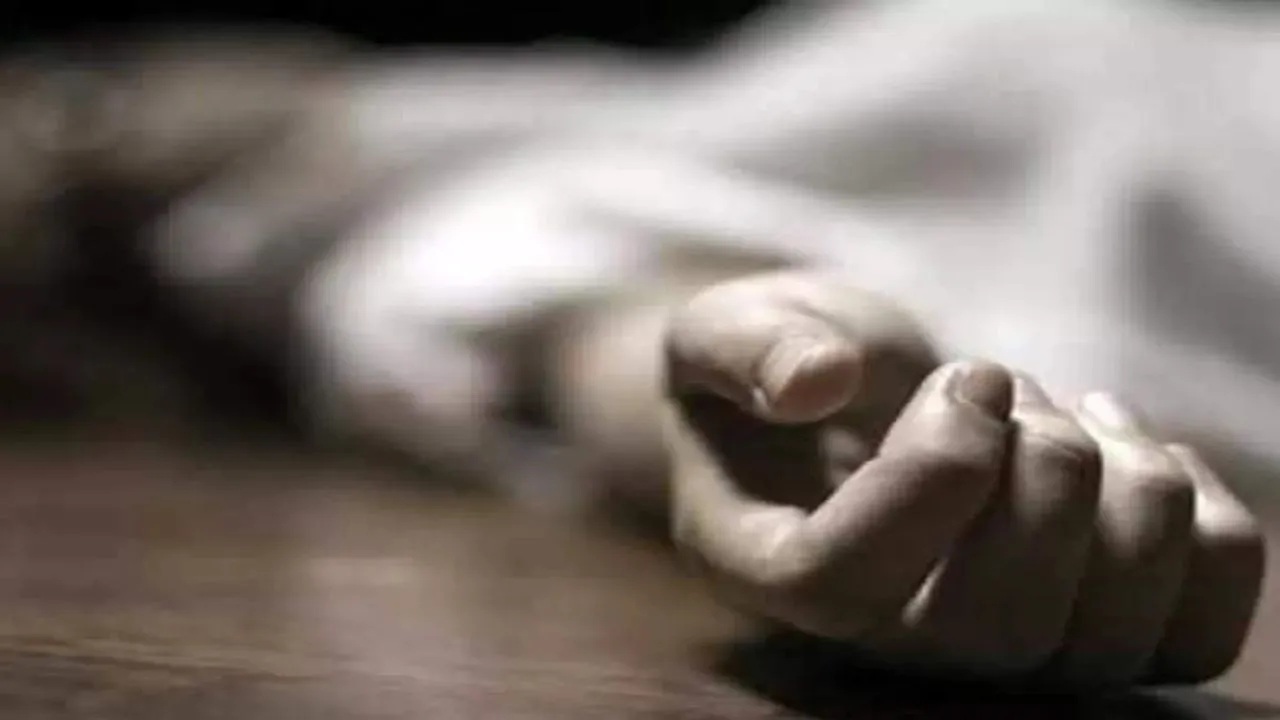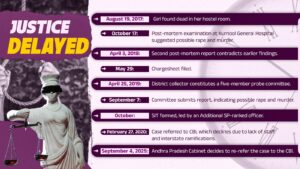On Thursday, 4 September, the Andhra Pradesh Cabinet 'reportedly' decided to refer the case to the Central Bureau of Investigation.
Published Sep 06, 2025 | 5:05 PM ⚊ Updated Sep 06, 2025 | 5:05 PM

The girl's mother said the marks seen on her daughter's neck were inconsistent with hanging.
Synopsis: Soon after the girl was found dead in her hostel room eight years ago, the school authorities wasted no time in labelling it a case of death by suicide. The girl’s mother, however, suspected foul play and embarked on a relentless pursuit of justice for her daughter. She received a poll-time promise, but nothing happened. The mother now has a glimmer of hope that the CBI will take up the probe and bring those responsible to book.
Mystery still surrounds the death of a 15-year-old tribal girl, even eight years after she was found hanging lifeless from the ceiling fan in her school hostel room in Andhra Pradesh’s Kurnool district.
The girl’s physically-challenged mother has been waging a fight, seeking justice for her daughter, whose demise was initially considered to be a case of death by suicide in 2017.
However, the case later evolved into a complex matter involving allegations of rape, murder, tampering of evidence, and political intervention. The mother’s relentless pursuit of justice for her daughter has kept the case alive, turning it into a symbol of systemic failures and a rallying point for civil society.
On Thursday, 4 September, the Andhra Pradesh Cabinet ‘reportedly’ decided to refer the case to the Central Bureau of Investigation (CBI). The government has yet to announce its decision.
The girl’s mother welcomed the move, but with caution. She expressed skepticism due to the lack of an official announcement.
“I support handing the case to the CBI, but the government must make a formal statement. They should urge the CBI to file an affidavit in the High Court, confirming the agency’s intent to investigate, especially since it had previously declined to probe,” the mother told South First.
“Mere letters won’t suffice without political will. The chief minister should personally take up the case with Union Home Minister Amit Shah to ensure action,” she said without making any attempts to hidRe her frustration over the multiple delays.
On 19 August 2017, the body of the girl, a student of Cattamanchi Ramalinga Reddy (CRR) High School on the outskirts of Kurnool, was found hanging from a ceiling fan in her hostel room.

The case so far.
The school management wasted no time in labelling it a case of death of suicide, but her family alleged foul play. They accused the school correspondent, V. Janardhan Reddy, and his sons, Diwakar Reddy and Harshvardhan Reddy, of sexually assaulting and murdering her, and covering up their tracks.
Later that month, the police arrested the trio but released them on bail within three weeks. Forensic reports allegedly detected multiple DNA samples. Still, the investigation stalled, sparking allegations of evidence suppression.
Recalling the incident, the mother said, “My husband went to the third floor of the hostel where her body was found. Her feet were touching the ground, and she was positioned upright. The marks on her throat suggested she was strangulated with a nylon rope before being making it look like a suicide. The marks on her neck were inconsistent with hanging.”
The mother sounded convinced that her daughter had been raped and murdered. She mentioned a “secret bedroom” controlled by the school management. A five-member probe committee appointed by the district collector had found the bedroom — suspected to be a chamber of secrets.
“If the correspondent and his sons didn’t commit the crime, then who did? The hostel is restricted to girls. They say the DNA on my daughter’s body didn’t match that of the culprits. In such a case, let the government find out the perpetrators. The influence of the accused let them evade justice,” she asserted.
The mother obtained the committee’s report after filing an RTI application. The report, she said, corroborated her fears of rape and murder.
In April 2019, the collector’s committee submitted its findings, suggesting rape and murder. By October 2019, a Special Investigation Team (SIT), led by an Additional SP-rank officer, was formed to reinvestigate. The probe, however, remained inconclusive.
On 27 February 2020, the then YSRCP government referred the case to the CBI. However, the CBI declined, citing insufficient staff and a lack of interstate ramifications. The CBI’s decision deepened public outrage and galvanised civil society. Activists, human rights groups, and the girl’s mother staged protests, filed court petitions, and even undertook hunger strikes — yet the case remained stalled.
Deputy Chief Minister Pawan Kalyan, who pledged justice for the girl before the 2024 elections, now faces criticism for inaction.
“It’s been 14 months since you became the deputy chief minister. Have you forgotten my daughter?” the mother asked in a widely circulated social media statement, challenging Kalyan’s image as a champion of the marginalised.
Opposition leaders accused both Kalyan’s Jana Sena Party and Chief Minister N Chandrababu Naidu’s Telugu Desam Party (TDP) of exploiting her case for electoral gain while failing to deliver. YSRCP leaders labelled the ruling alliance hypocritical, claiming, “It remembers the girl only at the time of elections.”
Kalyan’s supporters countered, saying the mother had accepted compensation from the government, five acres of land, a house, and an outsourcing job, implying her demands lacked merit.
“I accepted the benefits as my legal right. Does that mean the government can close the case? Isn’t it its duty to bring the guilty to book?” she retorted.
Naidu’s decision to re-refer the case to the CBI serves multiple purposes. It portrays his government as transparent and responsive while shifting responsibility to the Centre. If delays persist, the CBI, not the state, will bear the blame.
The decision requires formal notification under Section 6 of the Delhi Special Police Establishment Act, 1946. The CBI, if willing, then assumes control of case files and evidence. The Andhra Pradesh High Court, where related petitions are pending, may oversee the process to prevent further delays.
The move comes at a politically sensitive time, with the government grappling with fiscal challenges and welfare commitments. For Naidu, it is an opportunity to rebuild trust among the tribes, Dalits, and women voters. For Kalyan, it’s a test of credibility — failure could erode his support base.
Dalit organisations and women’s groups are closely monitoring, ensuring neither the ruling alliance nor the opposition can afford inaction.
If the CBI accepts the case, the investigation could be protracted due to the eight-year gap, faded witness memories, and legal hurdles. The agency will need to re-examine forensic evidence, witness statements, and potentially file fresh charges.
Civil society groups plan to file status petitions to keep the case under judicial scrutiny. The CBI’s earlier reluctance adds uncertainty, but the state believes only a central investigation can restore credibility.
(The identities of the victim and her mother have been withheld due to legal obligations. Edited by Majnu Babu).
